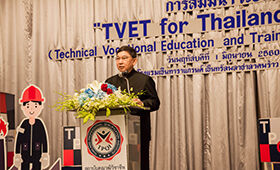Vocational education and training for "Thailand 4.0"
The Thai government are prioritising vocational education and training in their “Thailand 4.0” strategy in support of the economic and social modernization of the country. Important impetus for this could come from Germany. At the “TVET for Thailand 4.0” conference, the BIBB presented findings on the situation relating to IT occupations in Germany.

IT occupations also showing signs of ageing in Germany
The training occupations in the IT sector which were developed in the 1990s have proven to be a genuine success model. Since the introduction of the four IT occupations, an annual average of 15,000 young people have commenced training in the IT sector in Germany.
Henrik Schwarz, research assistant in the BIBB division dealing with electrical, IT and scientific occupations explained to the Thai audience at the “TVET Thailand 4.0” conference that, in view of technological developments over the last 20 years, it was, however, now time to check that the occupations were up to date.
The research team supporting Schwarz addressed the question of the extent to which new technological developments and associated qualification requirements can be adequately represented in the four occupations.
Changed qualification profile in IT occupations
As shown by the analyses, the IT sector is gaining in importance, in particular
- in the area of software development,
- analytical and communicative capabilities and
- the area of IT security.
In view of the current relevance of the “Industry 4.0” theme in Thailand, the public administration and vocational school representatives from Thailand showed a real interest in the activities and research findings of the BIBB. The conference, organised by the Thailand Professional Qualification Institute (TPQI), took place on 1 June in Bangkok and was opened by Deputy Prime Minister Air Chief Marshall Prajin Juntong.
Vocational education and training also a theme for “Thailand 4.0”
In its assessment written for the newspaper “The Nation”, the BIBB once again emphasised the role of (vocational) education and training in ensuring the social and economic participation of a country in times of technological progress.
This was also confirmed by Thai and German representatives from business and policy-making at the “Round Table on Vocational Education and Training” which took place in the German Embassy in Bangkok on 30 May. Together with the BIBB, stakeholders discussed the challenges which the Thai vocational education and training system had to overcome to achieve the desired technological and economic development of the country. They emphasised that vocational education and training had to be structured in line with the needs of the economy. Besides professional competencies, basic competencies, such as analytical and communication skills in particular, have a critical role to play in Thailand.
The BIBB has been cooperating with the TPQI and the office of the vocational education commission since 2014 to support the needs-based development of vocational qualification standards specific to Thailand.